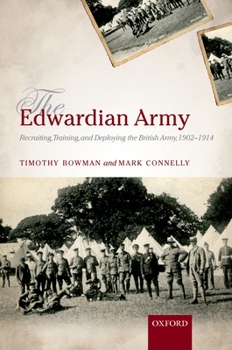The Edwardian Army: Manning, Training, and Deploying the British Army, 1902-1914
The period 1902-1914 was one of great change for the British army. The experience of the South African War (1899-1902) had been a profound shock and it led to a period of intense introspection in order to determine the strengths and weaknesses of the force. As a result of a series of investigations and government-led reorganisation, the army embarked on a series of reforms to improve its recruitment, standards of professionalism, training, and preparation for war. Until now many of the studies covering this period have tended to look at the army in a top-down manner, and have often concluded that the reform process was extremely beneficial to the army leading it to be the most efficient force in Europe by the outbreak of war in 1914. Bowman and Connelly take a different approach. The Edwardian Army takes a bottom-up perspective and examines the many difficulties the army experienced trying to incorporate the reforms demanded by government and the army's high command. It reveals that although many good ideas were devised, the severely overstretched army was never in a position to act on them and that few regimental officers had the opportunity, or even the desire, to change their approach. Unable to shake-off the feeling that the army's primary purpose was to garrison and police the British Empire, it was by no means as well prepared for European continental warfare as many have presumed.
Format:Hardcover
Language:English
ISBN:0199542783
ISBN13:9780199542789
Release Date:September 2012
Publisher:Oxford University Press, USA
Length:252 Pages
Weight:1.17 lbs.
Dimensions:0.6" x 6.1" x 9.2"
Customer Reviews
0 rating





